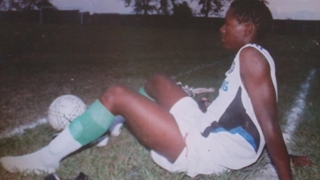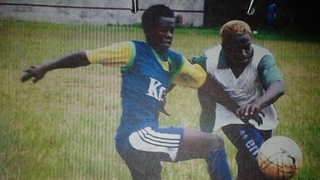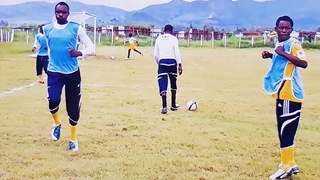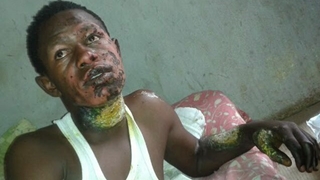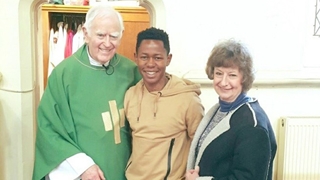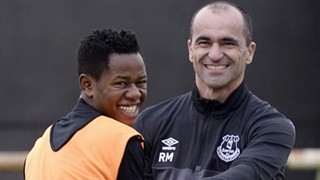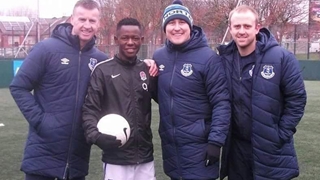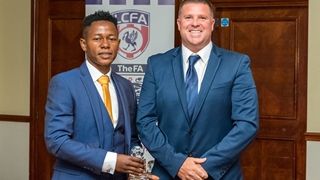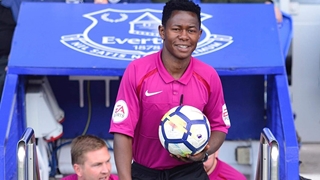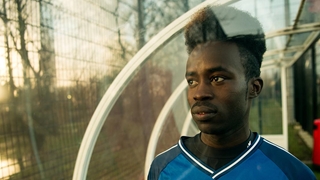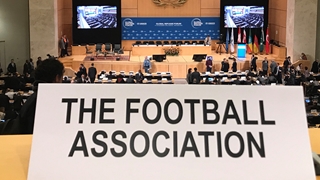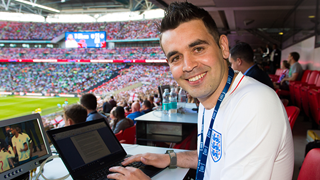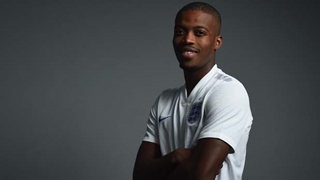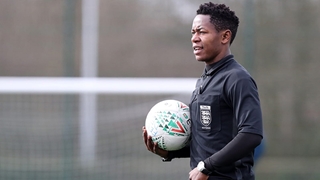
My name is Jacob Viera. I was born and raised in Nairobi, Kenya. This is my story.
It all started happily, when I was lucky to be one of the young players selected to compete in an U16 youth tournament in Arusha, Tanzania with teams from Uganda, Kenya, Burundi, Rwanda, Zanzibar and Mozambique.
Before departure, those selected spent two weeks in a hotel and it was here that I was approached by a group of five men. They knew the football bus would soon be making its way to Tanzania and they chose me to be their drug mule.
I was so scared. I was a young man but all too aware of the reality and seriousness of this proposition: agree to transport the drugs and be held responsible if caught, or refuse to co-operate and be dealt with there and then – to prevent you disclosing information to anyone else.
I thought the best thing for me to do was tell them the bus was departing a few days later than was scheduled. This way, when they arrived with the package, I would've already left. Afterwards, I told one of my friends and my manager about this terrifying dilemma.
The plan appeared to work and my deception paid off. We travelled to the tournament and reached the semi-finals where we lost against an older Ugandan team.
A month later, now back from Tanzania, it was in the papers that drug barons had been caught by police at the same hotel we had stayed, in possession of drugs a few days after we had left for Tanzania.
My family asked me to take extra precautions because it's well known that if a gang suspects you of setting them up, they'll take their revenge and assault or even kill you. For my own safety, I was sent to a boys’ boarding school in the western province, far away from Nairobi.
I loved the school, I played for the school team and I was safe there. The deputy principal, Mr Dismas Owuor, was one of the best English teachers in the country. He also doubled as the school team football manager with the help of Mr Sammy. I can tell you I was really good, on and off the pitch - very disciplined and dedicated.
After my high school education, I continued to play football with Muhoroni Youth FC for six months, before I moved back to Nairobi.
I was playing in the Kenyan premier league for both Tena United and Ligi Ndogo FC, which meant my name was now appearing in newspapers. With Tena United, I was privileged to be the captain who led a young team of very talented players side to promotion, but some unexplained events started happening to me and I became suspicious about who was behind them. Moving around was the only thing I could do and I avoided letting people know where I lived.
But on 10 June 2014, I returned home from training and reached out to grasp my metal door handle when there was a loud bang and after that, I heard nothing more.
I was thrown to the floor where I lay unconscious until my neighbour, Jimoh, saw my door slightly open and my body on the floor. He came to my aid and noticed that live wires had been attached to my door handle, these had been connected to an electrical socket. I had been electrocuted.
I was quickly rushed to hospital with the skin on my face, neck and left arm scorched off and pink in colour. My injuries were so severe that the doctor thought that I needed a miracle more than treatment.
My family were unaware of what was going on and initially, I was fighting for my life, alone.
I spent a month in hospital. Most of my face had no skin and other patients in the hospital were frightened to look at me – my looks scared them.
When I was discharged, I had only three weeks before I was due to fly to England for a football trial with Newcastle. When I got there, an academy staff member was interested to know what had happened to me, and I told him how I came to be standing before him with the injuries still raw and painful.
Honestly speaking, I was terrified of going back to face those people again in future and I'm still terrified today.
News about my story was being broadcasted and printed in Kenyan newspapers, even before I came to England, and many people knew what happened to me.
The academy manager suggested the best thing for me to do was to claim asylum and when asked to provide evidence, I was advised to basically print the information which was online and submit it to the Home Office.
Having listened carefully to the advice, I knew it was the best thing I could do to help my situation. Anyone in my position would have done the same for safety reasons. It was two weeks before my first screening interview in London and while I waited I played football as normal. I had permission to play in exhibition matches but now I was in the asylum system, I was no longer allowed to sign any professional contract until I was granted permission to stay in the country.
When it was time to go to London for my screening interview and did not have accommodation, I was transported us to a hotel - where hundreds of asylum seekers were accommodated.
During the few weeks I was there, I used to wake up at 5am and run a few miles near the hotel, just to keep myself fit and also search for any football training grounds. I really wanted to play some football. One morning while on my normal morning run, I came across the Crystal Palace ground and a local park. I was interested to see if there were any clubs having their training sessions there so that I could ask if I could join the sessions.
INSPIRED? START YOUR REFEREEING CAREER NOW!Sadly, there was no one there so the next day I missed my food and waited at the ground for teams to arrive for training. In the evening a team arrived and after watching them train, I asked their manager if I could come and join them for the next day’s training. He asked me questions which I was happy to answer and although he told me that he couldn't assure me of a place to train, he asked me to come back the next day at the same time.
I really enjoyed it and I was overwhelmed. The manager was interested in me joining them and when I explained my situation, he understood and asked me to return the following week.
As I was just getting changed to go back to the hotel, a spectator from the stands approached me - he was a scout for Tottenham Hotspur. He was also interested and could take me there for trials.
He said that if they accepted me, then they would sort out my case which was marvellous. He gave me his card and we agreed that he was coming to collect me from the hotel the following Monday afternoon.
But on the day, my name was displayed on the list for a second interview at the Home Office. I had to collect all my stuff together, get into the van and go for the second screening interview.
I wasn't worried, I hoped to go for the screening interview, come back to the hotel and then go with the scout to Spurs. I didn’t call the scout to inform him, because I assumed that things would be alright.
But after the interview, I was put on a fast track process and detained at Harmondsworth detention centre to await a quick decision. This was unbelievable, the officer took everything away from me including my phone and I was locked in a small room with five others, until we were driven to Harmondsworth that evening. It was near Heathrow Airport, we were locked up between 8pm and 10am and I thought I would be on the next flight back to Kenya.
You couldn't see outside, we used to look up in the sky and see planes going to land and those that were taking off. I never wanted to look in the sky because I used to see Kenya Airways every half an hour or so.
When it was time for me to do my full asylum interview, I remember I was in the gym when the officer came and escorted me to the room. The immigration officer was there waiting ready to interview me and a Home Office legal aid solicitor to represent me.
After the interview, I was released a day later and brought to Liverpool so that I could wait for my decision. First, a doctor had to examine my scarring to see if my injuries were consistent with my story.
It was time to start a new life again in Liverpool and when I got there, although I thought my English was fairly good, I couldn't understand the Scousers properly with their strong accent and lots of slang.
However, I was warmly welcomed by the lovely members of St Anne's Catholic Church, where I became an alter server. The first people I met were the priest, Father Peter Morgan, Margaret Kane, Neil and Lawl.
It’s because of this church that I felt so welcomed in Liverpool during the first week and after a short time, I could better understand Scouse. Liverpool became my second home away from home. I started playing for local clubs like Edge Hill FC, Mosley Hill Athletic, Mandela FC and Dengo United.
Before long, I was invited to train with the Everton FC academy U18 squad, under Paul Tait. I thought that I was dreaming. Players that I used to watch on television while in Kenya were there, on the next pitch to me at Finch Farm.
The facilities were brilliant. I’d never trained on such grounds before in my whole life. Everything was amazing and the staff so friendly. Indeed: "Nil Satis, Nisi optimum."
And that was the place to be if you needed to be the best. Yet frustratingly, until my immigration status was sorted out, I wouldn't be signing any contracts.
The first team manager, Roberto Martinez, became and will always be my favourite Premier League manager. He was a very good man, not just as a manager but as a person.
When he was sacked, this was really heart breaking for me. I loved this man and the fact that he believed in young players from the academy and gave them chances. He encouraged each and every one of us to work extra hard.
The other man I met there was Stuart Carrington - a good man with a heart full of kindness, love and support. Anytime I needed or still need advice, he's the man. Before I make any decision, he has to know. It's because of Stu that I've learnt a lot, gone to places and he has created for me a brighter future.
And Everton in the Community really played a big part in my life. I remember after I had anterior cruciate ligament surgery following an injury I picked up playing for a local club, I couldn’t play football for a year and they sponsored my football courses at Goodison Park and Everton Free School.
Among the courses I completed were FA Coaching Level 1, Football and First Aid coaching, Mental Health Awareness, FA Emergency Aid, Prince's Trust ‘Get Started With Football’, Barclays Premier League Works, Coaching Programme with Everton, First Aid Emergency Response and more.
Being part of the community, I've involved myself in different projects where I volunteer for coaching sessions and meet new people and make friends, such as sessions with asylum seekers and refugees living in Liverpool, every Tuesday and Thursday. It’s through this that I won the 2017 Young Volunteer of the Year Award, presented by the Liverpool County FA.
As I continued with my knee rehabilitation, Stuart introduced me to the Liverpool County FA to start my refereeing and it's here that I came to meet very kind, generous and lovely people who have taken me in as their own son.
With my refereeing journey, it’s been absolutely fantastic. I started as a level eight and nine referee when I had my ACL injury to keep myself going with football before my recovery. One year later, I loved refereeing more than playing. My County FA gave me an opportunity and always offered to help with anything.
These people have made me push myself to the limit in terms of my refereeing career. I had to commit myself, work hard and show determination. I’ve loved every single game I've refereed to get promoted. Whether it was girls, boys or men’s games, I've had the passion and the teams can testify that I've always given my best.
I was selected to be on the FA CORE programme in which as a young referee, you are given a coach/ mentor that guides you and advises you on becoming a better referee. When I started, I never had any self confidence, I was very weak mentally and I wasn’t one of the best. It is through the CORE that the coaches have helped me build on my communication skills and improve on my knowledge.
I’ve since won the Liverpool Grassroots match official of the year award in 2017-18, one of my career highlights and it’s because of the Liverpool County FA that I've met Premier League referees like Anthony Taylor through FA CORE regional assessments.
This season I was buzzing when I received an email from the FA congratulating me on my promotion to level four. This is what any referee would want to hear. The FA has given me an opportunity that I’ve grabbed with both hands and it’s up to me to use it in achieving my dreams.
I know I’ve got a long way to go with my refereeing career but as for now, I’m proud of what I've achieved and happy for the safety I’ve had while I’ve been in England.
Being in danger in my country was the worst thing for me, especially as a footballer. But life has to go on. I love my country apart from a few individuals who wish to destroy me for something I did not do. I’m proud of what I've achieved and where I am today.
When I look back, I am always thankful and grateful to the people who have been behind my success. Above all, glory be to God Almighty.
I have faced many challenges - especially with my asylum case and gaining permission to stay in the UK. There are times when my NASS support was stopped, times when my case was refused a number of times and had no food, no money and it seemed to be the end of the world for me.
I have come to learn that in life, if at first you don’t succeed in whatever you want to achieve, keep trying a million times, even in tough times and never quit. If you believe, every failure can be a stepping stone to something better. Life has knocked me down a few times. It showed me things I never wanted to see. I’ve experienced sadness and failures but one thing is for sure, I always get up.
Now, I’m living with my wife who I first met back in 2015, and we have an 11-month old daughter, so it’s been a happy outcome for me.


